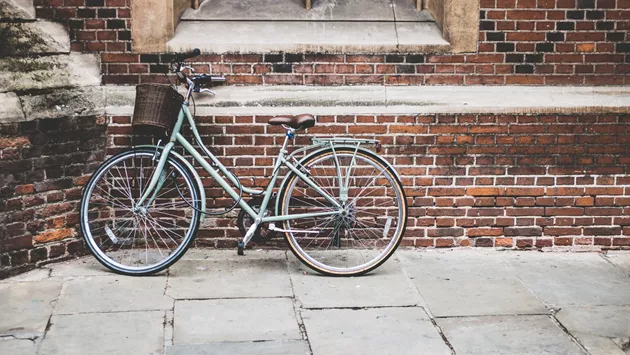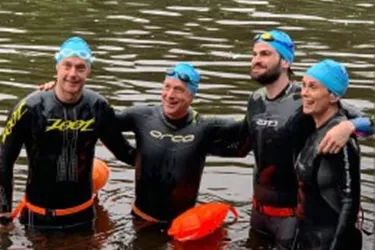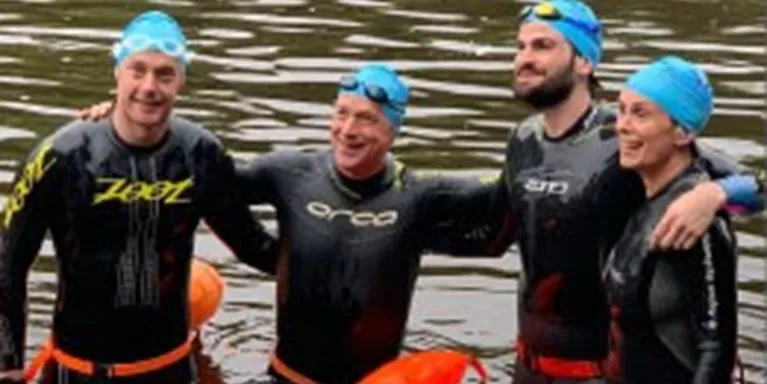Catching up with Black Dog Runner
Thinking of running for Mind this year? We catch up with fundraiser #BlackDogRunner, who ran the Great North Run (GNR) dressed as a nine-foot black dog, to find out more about his experience.
Why did you decide to run the Great North Run for Mind?
I had a mental health crisis! I'd been in remission for nearly a decade and although I was on antidepressants I naively thought I was over it. When it came back, it hit me really hard. Although I got myself quickly onto the list for therapy, it was a while to wait, and every day is an age when you're feeling that desperate. I needed a project to focus on; something meaningful that could provide a sense of purpose. That's where the idea to run the GNR came from. I chose Mind because I wanted to help raise awareness of depression. And because I think their work is vital. Not just giving advice and support to those in need, but also campaigning and raising awareness
What was the idea behind running as a black dog?
The 'black dog' - that miserable presence that follows you around and darkens your world - is a fairly old metaphor for depression. I personally don't think it entirely grasps the complexity, but I do find it helpful to think of my depression as separate from me; something I'm struggling against. Running became a bit of a symbol of that struggle; although my black dog had me on the run, I hadn’t stopped running. I thought it'd be fun to represent that. I also hoped it would help raise awareness. A lot of people with depression hide their black dogs because of shame and stigma. I hoped that running in a nine-foot costume would show that we don't have anything to hide.
You say running had become a symbol of your struggle; do you find running helps your mental health?
Yes, but not how I expected. I started running out of desperation; I was looking for any source of hope. With all those posts claiming 'running is the best antidepressant' I thought it was worth a try. When I first started, I was a bit disappointed. I'd been expecting a miracle, but the boost seemed quite small, I certainly didn't get a 'runner's high'. Now I've been running a bit more, I think I have more reasonable expectations. It definitely helps me sleep, which is extremely important to my mood. A good run also really helps reduce my anxiety, albeit only for the next two to three hours.
Had you done much running before you signed up to the GNR?
Nope! I only started a few months beforehand, when I had my crisis. I'm definitely not a natural athlete. When I started, I was just a sweating, wheezing blob. I was so anxious about being seen in public that I used to take a route by the sewerage works, where few others dare to venture.

How did you find training?
Tough! I found it particularly hard to get out in the cold or wet. But the fear of knowing I'd eventually have to run 13.1 miles was a good motivator. The biggest challenge was my health. About four months before the race I had a terrible bout of fatigue; I could barely run a few hundred yards. That was my lowest point; I very nearly gave up. Luckily a few weeks of proper rest seemed to shake it.
What was it like, taking part in the Great North Run?
Absolutely amazing! I was completely unprepared for the scale. 57,000 runners… And then there's the crowd. It was a hot sunny day, so people were cheering along the whole route. The kids got very excited by my outfit. During the first few miles I was waving and giving lots of hi-fives but by the end I could barely lift my arms! The truth is I underestimated the challenge; 13.1 miles is no leisurely run-in-the-park. It was a hot day and the costume proved extremely impractical. I ended up in the medical tent, but they were lovely and I even collected a few donations!
How was Mind's support during your training and fundraising and on the day of the run?
I was so proud to be running for Mind; they made me feel really valued. I treasured my running pack, and I've kept my good luck and thank-you cards. But, for me, it was the support on the day that helped most - I really welcomed the cheer at the Mind charity point, not to mention the encouragement of all the other Mind runners. In fact, just seeing someone in a Mind vest gave me a glow of pride! Mental health may never get the same attention as cancer or heart disease, but the tide is turning, people are starting to recognise what an effect it has.
How does it feel to have raised so much money?
When I signed up, I was worried I'd manage to raise the target £300, so to get nearly £3,000 (with gift aid) was unbelievable. I got over 200 donations from all walks of life – it was really really humbling. And it really helped when I was struggling to finish; it was like they were all there cheering me on.
Are you still running?
I am! I've been suffering from severe anxiety over the past couple of months, so the running has been vital. But I'm looking forward to Spring, this winter weather is evil!
Do you think you will ever run in a black dog costume again?
I can't for now, due to problems with my medication. But in the future, I'd love to! I poured a lot of energy into that blasted costume so it'd be a shame to leave it in the attic. But I might add a few more air holes, so it's less like running with a sofa on my head.
Do you have any advice for anyone thinking of running in the GNR or Royal Parks Run for Mind?
Ha! I'm no expert, but how about:
- Get a good pair of running shoes and train in them for at least three months before the race
- If you've got health problems then be sensible – don't push yourself too hard and make yourself worse.
- Just do it - it's an incredible experience, and Mind are a wonderful and worthwhile charity.

Get involved
There are lots of different ways that you can support us. We're a charity and we couldn't continue our work without your help.
Share your story with others
Blogs and stories can show that people with mental health problems are cared about, understood and listened to. We can use it to challenge the status quo and change attitudes.

















